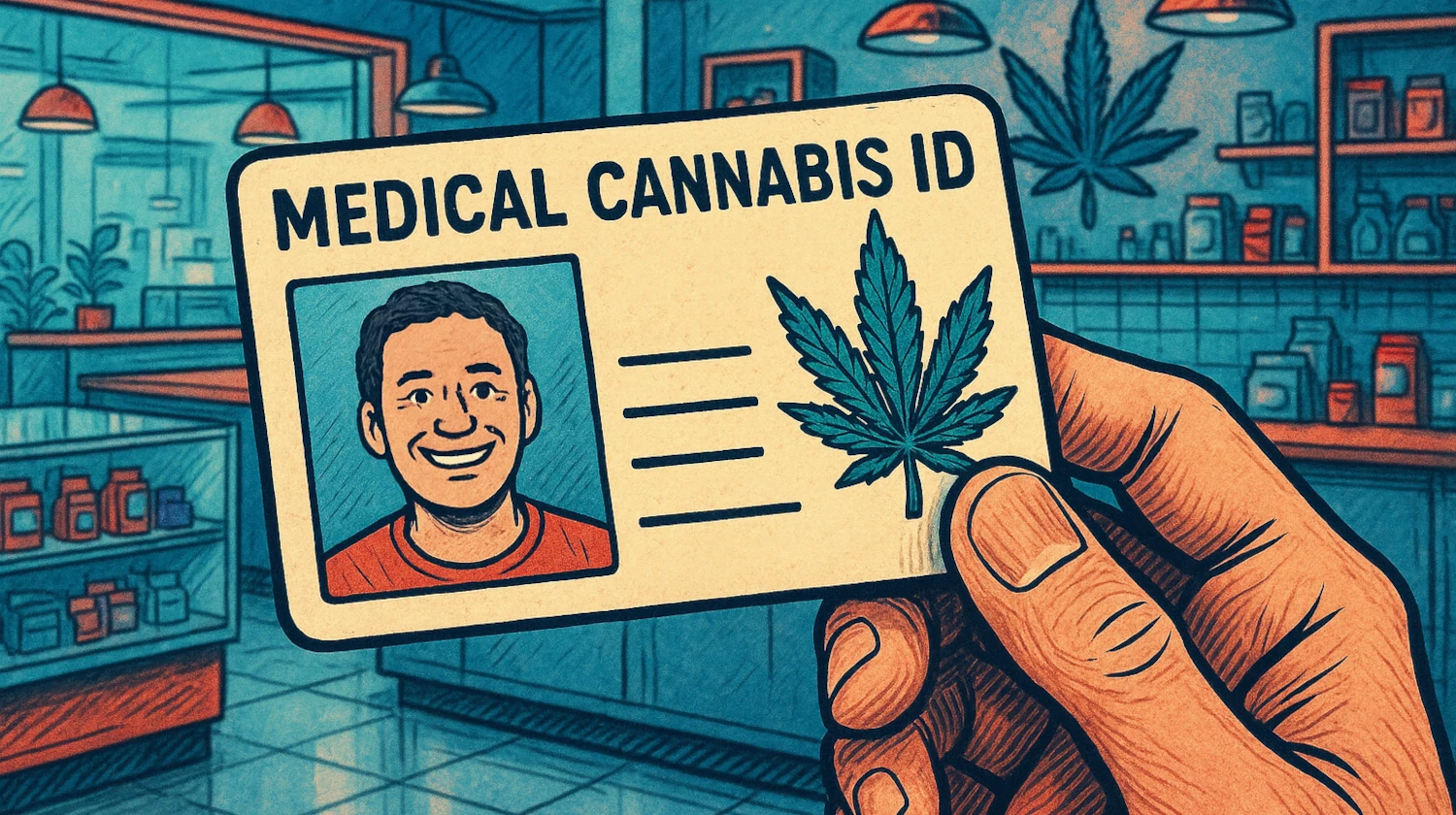In This Article
- Does Insurance Cover Medical Marijuana?
- Does Medicaid Cover Medical Marijuana?
- Does Medicare Cover Medical Marijuana?
- Does Private Health Insurance Cover Medical Cannabis?
- Does Being an MMJ Card Holder Affect Health Insurance Cost?
- Does Insurance Cover Any THC Medications?
- Does Health Insurance Cover CBD?
- How to Get Affordable Medical Marijuana
- References
Key Takeaways
- Cannabis is moving from Schedule I to Schedule III, but only a few cannabinoid-based medications are FDA approved.
- Private insurance, Medicare, and Medicaid won’t cover Schedule I or medications not approved by the FDA.
- Private insurance, Medicare, and Medicaid will not cover the cost of medical cannabis.
A growing pool of people are saving space in their medicine cabinets for cannabis for a number of reasons, from helping with pain and relieving stress to helping induce sleep or appetite. Harvested from the earth for thousands of years by humans across global civilizations, this plant of ancient origins is now legal for medical use in 38 U.S. States and the District of Columbia. But, is medical marijuana covered by insurance?
Although widely available to patients, cannabis' federally illegal status makes it impossible for health insurance providers to cover the cost of medicine. However, there are various ways to access herbal remedies.
Does Insurance Cover Medical Marijuana?
The question, "Does insurance cover medical weed?" crops up in many patients' minds, but to their dismay, it's usually not an option. Cannabis compounds like delta-9 THC are controlled substances, and it is not yet legal to prescribe cannabis-derived THC at the federal level. Even though the DEA initiated the rescheduling of cannabis to Schedule 3, this doesn't make the products sold under state medical or recreational cannabis laws legal on the federal level. Products must be approved by the FDA before they can be legally marketed to treat a condition. So it's likely that the products patients currently use won't be covered by insurance after rescheduling.
Until the DEA and the FDA give cannabis its seal of approval, health insurance providers will not be legally able to include medical cannabis on their drug formulary. Despite the medically proven benefits of cannabis — the National Academies of Science, Engineering, and Medicine (NASEM) notes substantial evidence of cannabis' potential in the management of chemotherapy-induced nausea and vomiting, pain, spasticity, and neurodegenerative disease — it is ineligible for any health insurance coverage, just like other federally illegal substances.1
If an insurer agrees to cover medical cannabis, they risk facing legal action and having their company sanctioned. Even the Affordable Care Act (ACA), which devotes itself to protecting the health of patients and their families, does not lean beyond the boundaries that the DEA has put in place.
Does Medicaid Cover Medical Marijuana?

Medicaid is the nation's leading program offering comprehensive healthcare coverage to over 85 million low-income people in the U.S. The federal government established Medicaid in 1965 to cover the cost of various healthcare services, including inpatient and outpatient care, to children, pregnant women, families, seniors, and disabled individuals.
State-administered Medicaid operates in line with federal requirements. It receives cooperative funding from states and the federal government, so there's zero chance that a Medicaid plan will cover your monthly medical cannabis costs. Medical marijuana has historically been stuck in the Schedule I drug category, meaning that the DEA classifies it as a substance with "no currently accepted medical use and a high potential for abuse." However, efforts are underway to reschedule it under Schedule III, which would allow companies to produce medications using cannabis and the FDA to approve them. It's unclear whether the FDA would approve whole-plant cannabis – a requirement for doctors to prescribe it.
So, does Medicaid cover medical marijuana if it doesn’t include THC?
So far, one CBD product (Epidiolex) and three synthetic THC products (Syndros, Marinol, and Cesamet) have gained FDA approval for prescription use. With studies supporting the seizure-reducing qualities of the primary non-intoxicating element of cannabis, cannabidiol (CBD), in young patients with epilepsy — e.g., Dravet syndrome and Lennox-gastaut syndrome — Medicaid coverage may also be an option under the Children's Health Insurance Program (CHIP).
Does Medicare Cover Medical Marijuana?
Medicare is a form of federal health insurance that serves people aged 65 and over and individuals with specific disabilities, including those with end-stage kidney disease. The program has grown rapidly since it started in 1965 under the Social Security Administration's (SSA) management. It is now run and overseen by the Centers for Medicare and Medicaid Services (CMS).
Medicare divides its coverage plans into four segments:
- Medicare Part A - Inpatient/hospital coverage
- Medicare Part B - Outpatient/medical coverage
- Medicare Part C - Comprehensive Medicare-approved plans by private companies that bundle the benefits of Part A, Part B, and occasionally Part D.
- Medicare Part D - Prescription drugs.
Unfortunately, for medical cannabis patients, this program is federally funded from the payroll taxes distributed by the Federal Insurance Contributions Act (FICA). Due to its federal oversight and financial backing, Medicare coverage does not include cannabis. An April 2022 Medicare Plans Patient Resource Center poll found that 66% of 1,250 Medicare members were asked if they think Medicare coverage should consist of cannabis-based medications.
However, there may be a way around it for some people who rely on cannabinoid-based medications. Dronabinol (Marinol, Syndros) and Epidiolex have received FDA approval; therefore, they may be covered in Part C and D.
Does Private Health Insurance Cover Medical Cannabis?

The general policy among private health insurance providers excludes cannabis-based treatments due to the plant's illegal status. If a substance hasn't been FDA-approved, it is doubtful that a provider will acknowledge it on their health plans.
A typical health insurance policy states that health problems arising from or in connection with a person's voluntary involvement in an unlawful act are not eligible for coverage, so you'd be better off getting a medical cannabis card.
Although New York lawmakers recently approved a bill that would make it obligatory for statewide private insurers and public health insurance companies to provide coverage for medical cannabis as a prescription drug, such efforts have not extended beyond the state. However, this may assist other states in gaining approval in the future.
Currently, most health plans include a drug formulary—a list of covered medications for plan members—that the provider's pharmacy and therapeutics advisory group must update to include cannabis before adding it to a patient’s health insurance plan. So, if it's not on there, your best bet would be to obtain a medical cannabis card for sales and tax-free purchases.
Does Being an MMJ Card Holder Affect Health Insurance Cost?
When taking out health insurance coverage, providers must first assess your situation. Numerous factors may influence whether the price sinks or soars. Providers will consider your age, lifestyle habits like smoking tobacco, and location.
A research paper in the International Journal of Drug Policy found that medical cannabis laws lower individual market health insurance premiums. According to the information gleaned from the National Association of Insurance Commissioner's 2010–2021 state-level U.S. private health insurer financial data, lower health insurance premiums were noticeable seven years after the implementation of medical cannabis laws across the U.S.
The researchers found a reduction of $1,662.7 for states that implemented medical cannabis laws (MCLs) compared to the control group, a decrease of $1,541.8 in year eight and $1,625.8 in year nine. This information tells us that "households that obtain their health insurance on the individual (i.e., not employer-sponsored) markets in states with MCLs appreciate significantly lower premiums."2
Does Insurance Cover Any THC Medications?

Do dispensaries take insurance? The intoxicating cannabinoid tetrahydrocannabinol (THC) is mind-altering and is the underlying reason for the illegal status of cannabis. Although it harbors medical benefits — THC may ease nausea and vomiting associated with cancer treatment — the federal government is not a fan.
The good news is that scientists and pharmaceutical drug manufacturers have been dabbling in synthetic THC experiments to imitate the plant-derived chemical, with the FDA having approved three synthetic THC-based medications over the last three and half decades. This FDA approval means that insurance covers the following medicines for most patients:
- Marinol
- Cesamet
- Syndros
To act in accordance with the law and ensure that patients can still harvest the benefits of THC without actually consuming the Schedule I substance, manufacturers developed the above synthetic forms of THC in a lab. All three of these are FDA-approved pharmaceutical drugs and are not classified as Schedule I substances, so most major insurance providers cover them for specific conditions.
Does Health Insurance Cover CBD?
The first cannabis-derived medication ever approved by the FDA is a form of CBD. The medication, Epidiolex, was approved for treating severe cases of epilepsy. The approval came shortly after the memorable passing of the 2018 Farm Bill. Since CBD is legal on the federal level and the FDA approves the medication, most insurance providers cover Epidiolex.
If you need help reducing the cost of your cannabis medication, check out our guide on Cannabis Sizes & Prices (and Are Premium Brands Worth It?).
The information in this article and any included images or charts is for educational purposes only. It is neither a substitute for, nor does it replace, professional legal advice or medical advice, diagnosis, or treatment. Consult an attorney, physician, or other licensed professional if you have any concerns or questions about laws, regulations, or health.
How to Get Affordable Medical Marijuana

Do dispensaries take insurance? No, but there are two main options for getting affordable medical cannabis: buy it with an MMJ card or grow it yourself. Hardship programs or "Compassionate Care Programs" may offer a safety net for patients who require financial assistance in procuring cannabis-based medicines. However, each state's scheme may differ, so read up on the program's support options beforehand.
Some states also allow home cultivation and caregiver cultivation. Home-grown cannabis is usually cheaper and enables growers to control crop quality. Research reports that just 7.3% of survey respondents go down this route, which requires more effort and patience.3 Individuals who don’t wish to grow their own may be eligible to select a caregiver or grower to do it for them. Caregivers designated to supply home-grown cannabis to patients for medical purposes must obtain an MMJ caregiver card, and the limitations depend on the issuing state.
Doctors cannot prescribe medical cannabis due to its legal status, but they can recommend it. With a recommendation, you're halfway there. A doctor's recommendation bags you a card that you can present to the tellers when buying medical cannabis at any licensed dispensary.
Speaking to an expert for personalized guidance is the best way to maneuver through the maze of medical marijuana. From understanding cost by state to sailing through doctor evaluations, and whether you're a new patient or renewing a medical card, NuggMD has your back. Our leading platform prides itself on granting patients their medical cannabis card swiftly after signing up.
References
- National Academies of Sciences, Engineering, and Medicine, Health and Medicine Division, Board on Population Health and Public Health Practice. Therapeutic Effects of Cannabis and Cannabinoids In: The Health Effects of Cannabis and Cannabinoids: The Current State of Evidence and Recommendations for Research. National Academies Press (US); 2017. https://www.ncbi.nlm.nih.gov/books/NBK425748/ ↩︎
- Cook AC, Sirmans ET, Stype A. Medical cannabis laws lower individual market health insurance premiums. The International journal of drug policy. 2023;119:104143-104143. doi:https://doi.org/10.1016/j.drugpo.2023.104143 ↩︎
- Wadsworth E, Schauer GL, Hammond D. Home cannabis cultivation in the United States and differences by state-level policy, 2019-2020. Am J Drug Alcohol Abuse. 2022;48(6):701-711. doi:10.1080/00952990.2022.2132507 ↩︎
The information in this article and any included images or charts are for educational purposes only. This information is neither a substitute for, nor does it replace, professional legal advice or medical advice, diagnosis, or treatment. If you have any concerns or questions about laws, regulations, or your health, you should always consult with an attorney, physician or other licensed professional.




